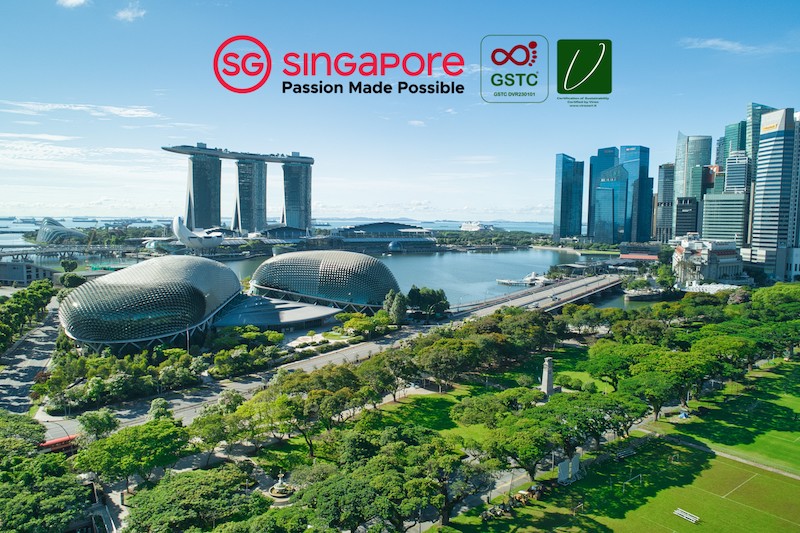
(TAN): Singapore has been certified as a sustainable destination based on the Global Sustainable Tourism Council (GSTC)’s Destination Criteria, after being the first to apply the certification process on a country level, the country’s tourism board said in a news release.
The GSTC Criteria are the global standards for sustainable travel and tourism, and Singapore was certified based on our performance in four pillars: sustainable management, socio-economic sustainability, cultural sustainability and environmental sustainability. Singapore’s achievement reflects the commitment towards the Singapore Green Plan 2030, and is also in line with the Singapore Tourism Board’s (STB) Tourism Sustainability Strategy. The Tourism Sustainability Strategy was launched in 2022 and sets out actionable strategies for the tourism industry so that Singapore can become a sustainable urban destination.
[ALSO READ: ‘Hong Kong Flavours’ available on Cathay Pacific flights]
Singapore’s certification follows similar achievements by key tourism partners such as Sentosa Development Corporation, Resorts World Sentosa and Marina Bay Sands Singapore, which had also achieved certification based on the relevant GSTC Criteria.
STB’s CEO Keith Tan said: “We are proud to receive this certification, which reflects Singapore’s commitment to the Singapore Green Plan 2030 and becoming a City in Nature, where large experiences come with a small footprint. Being certified is just the beginning of our journey. Tourism businesses must do more to internalise sustainability as part of their offerings, so that they can contribute to making Singapore greener and more liveable. Our vision is to become one of the world’s most sustainable urban destinations and we now know we are on the right track.”
GSTC CEO Randy Durband said, “The commitment from Singapore’s tourism sector to support their national Singapore Green Plan 2030 is apparent based on their holistic approach to sustainable tourism. We see first-hand some of their efforts to engage key subsectors of tourism in meaningful ways. Gaining destination certification requires that level of commitment and holistic approach. We commend them and are pleased to support their efforts for continuous improvement.”
[ALSO READ: Oceania Cruises promises new and immersive Alaska experiences]
Sustainable management
Singapore is implementing multi-year strategies and action plans on sustainable management, such as the Singapore Green Plan 2030. Announced in 2021, the Green Plan charts Singapore’s ambitions and targets over the next ten years, strengthens its commitments under the UN’s 2030 Sustainable Development Agenda and Paris Agreement, and positions the country to achieve net zero emissions by 2050.
Another example is the Tourism Sustainability Strategy, which was developed in line with the Green Plan. The strategy charts three strategic focus areas to steward the tourism industry’s sustainability efforts – becoming a sustainable urban destination, building a sustainable tourism sector, and showcasing Singapore as a sustainable urban destination.
Socio-economic sustainability
Singapore also demonstrated efforts to maximise the social and economic benefits of tourism for locals. These include supporting and spotlighting local entrepreneurs, providing a safe and secure working environment, a user-friendly built environment, as well as supporting career opportunities and training in tourism.
[ALSO READ: Old and new merge in Newcastle, Australia]
STB’s Tourism Sustainability Programme (TSP) also supports tourism businesses across all stages of their sustainability journey – from building workforce capabilities, to leveraging technology and test-bedding sustainable solutions.
Cultural sustainability
Singapore has various initiatives to conserve and enhance its tangible and intangible heritage. For example, there are legislation and conservation guidelines to protect more than 7,200 conserved buildings, entire historical districts, and national monuments. The Singapore Botanic Gardens was named a UNESCO World Heritage Site in 2015, making it the first and only tropical botanic gardens in Asia on UNESCO’s World Heritage List. Hawker Culture in Singapore was also successfully inscribed as Singapore’s first element on the UNESCO Representative List of the Intangible Cultural Heritage of Humanity on Dec 16, 2020.
[ALSO READ: Air India orders 470 aircraft from Airbus and Boeing]
Environmental sustainability
Singapore has implemented a range of measures to enhance greenery, strengthen ecological connectivity between green spaces, and conserve its biodiversity. For example, the OneMillionTrees movement, launched in 2020, aims to plant one million additional trees across Singapore by 2030 with the help of the community, and the target is on its way to being met. The country is also charting concrete targets and demonstrating real-world sustainability applications to manage its scarce resources. Singapore enhanced its international climate commitment to achieve net zero emissions by 2050.
Tourism products and experiences have also been built with sustainability in mind.




